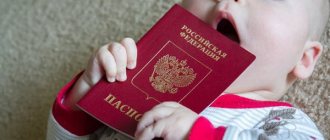Property rights of the child: general provisions
The property rights of the child are enshrined in the civil and family legislation of the Russian Federation.
The Family Code of the Russian Federation establishes that a minor child exercises the following property rights:
- receiving maintenance from mother, father and other family members, including receiving alimony;
- ownership of own income and the ability to make transactions;
- the right of ownership of property received by a child under a gift agreement or by inheritance.
Please note : a child does not have ownership rights to property that is owned by his parents. At the same time, children have the right to use the property and property of their parents by their mutual consent.
However, things purchased with parents’ money for personal use (clothes, shoes, soft toys, books, etc.) remain the property of the child, and in the event of a parent’s divorce are not subject to division. Also, during a divorce, funds deposited in a bank deposit or account for the needs of the child are not divided.
In turn, parents do not have the right to lay claim to the property of a minor child.
Is it possible to recognize a minor as having lost (not acquired) the right to use residential premises if he is registered in this premises, but does not actually live there? Answer: It is possible in the case where the right to reside in the disputed residential premises was lost by the parents, and the registration of the child is of a formal nature. Rationale: The place of residence of minors under fourteen years of age or citizens under guardianship is recognized as the place of residence of their legal representatives - parents, adoptive parents or guardians (Clause 2 of Article 20 of the Civil Code of the Russian Federation). Parents are responsible for the upbringing and development of their children, they are obliged to protect their rights (clause 1 of article 56, clause 1 of article 63 of the Family Code of the Russian Federation). From these norms it follows that the right of minor children to residence is derived from the rights of their parents, since persons under the age of 14 cannot independently exercise their rights, including to move into and live in residential premises. In practice, the child is registered at the place of residence by the parents, who are either family members of the owner or family members of the tenant under a social tenancy agreement. In the disputes under consideration, the minor does not have ownership rights in relation to the residential premises, but is endowed with other property rights, in particular, residence in it. The right to use residential premises of citizens living together with the owner in residential premises belonging to him is regulated in Art. 31 of the Housing Code of the Russian Federation. It is stipulated that members of the owner’s family have the right to use this residential premises on an equal basis with its owner, unless otherwise established by agreement. In paragraph 11 of the Resolution of the Plenum of the Supreme Court of the Russian Federation dated July 2, 2009 N 14 “On some issues that arose in judicial practice when applying the Housing Code of the Russian Federation” the above provisions of Art. 31 of the Housing Code of the Russian Federation (hereinafter referred to as the Housing Code of the Russian Federation), indicating that family relationships are characterized, in particular, by mutual respect and mutual care of family members, their personal non-property and property rights and obligations, common interests, responsibility to each other, and the management of a common household . By virtue of Part 4 of Art. 31 of the Housing Code of the Russian Federation, in the event of termination of family relations with the owner of a residential premises, the right to use this residential premises for a former family member of the owner of this residential premises is not retained, unless otherwise established by an agreement between the owner and the former member of his family. When considering disputes about recognizing a minor as having lost (not acquired) the right to use residential premises, the courts establish the following circumstances: a) whether the child is a member of the family of the owner of the premises, whether there are family relations; b) whether he has ever lived in this residential premises. The Supreme Court of the Russian Federation recognized as legal the court's decision to satisfy the grandmother's claim for termination of the right to use residential premises, deregistration of her grandson, who never lived with her, after the death of his father - her son (Decision of the Supreme Court of the Russian Federation dated December 22, 2015 N 5 -KG15-190). The Supreme Court of the Russian Federation indicated that the state of relationship and registration at the disputed address in the absence of family relations cannot serve as sufficient grounds for the conclusion that the grandson is a member of the family of the owner of the disputed apartment, and, therefore, has the right to use the residential premises (similar court practice: Appeal ruling of the St. Petersburg City Court dated February 11, 2016 No. 33-3086/2016 in case No. 2-7757/2015). The termination of family relationships is also the divorce of parents, the loss of marital relations. The court granted the claim of the grandmother (the owner of the apartment) to terminate the right to use the residential premises of her granddaughter, who had never lived with her, after deregistration of the father (her son) at the same address and the termination of his marital relationship with the girl’s mother. The court came to the conclusion that the termination of the right to use the father’s apartment is the basis for deregistering the granddaughter at the address of the disputed apartment (Appeal ruling of the St. Petersburg City Court dated February 11, 2016 No. 33-3086/2016 in case No. 2-7757/2015) . The courts resolve cases differently when the child was registered at the place of residence of one spouse, but in fact he lives with the other. In such cases, the courts refuse to recognize a minor as having lost (not acquired) the right to use residential premises, since in this case the minor does not live in the disputed apartment due to circumstances beyond his control and, due to his age, cannot independently realize his housing rights and obligations (for example, the Appeal ruling of the Moscow City Court dated 02.16.2016 in case No. 33-5516/2016, Appeal ruling of the Moscow City Court dated 09.24.2015 in case No. 33-35160/2015, Appeal ruling of the Moscow City Court dated 09.18.2014 in case N 33-22934 , Appeal ruling of the Moscow City Court dated 04/06/2015 in case No. 33-8580, Appeal ruling of the Supreme Court of the Republic of Bashkortostan dated 11/05/2015 in case No. 33-19535/2015, Determination of the Kaluga Regional Court dated 10/01/2015 in case No. 33-3118 /2015). When resolving cases under consideration on claims of employers based on social tenancy agreements, the courts are guided by similar principles, but in connection with other applicable legislation there are a number of differences. Housing legislation provides that family members of a tenant of residential premises under a social tenancy agreement include his spouse living with him, as well as the children and parents of this tenant; other relatives and disabled dependents are recognized as family members if they are installed by the employer as members of his family and maintain a common household with him (Article 69 of the Housing Code of the Russian Federation). In Art. 71 of the RF Housing Code provides that the temporary absence of a tenant of a residential premises under a social tenancy agreement, any of his family members living with him or all these citizens does not entail a change in their rights and obligations under the social tenancy agreement. In paragraph 32 of the Resolution of the Plenum of the Supreme Court of the Russian Federation dated July 2, 2009 No. 14 “On some issues that arose in judicial practice when applying the Housing Code of the Russian Federation” detailed explanations are given regarding the provisions of Art. 71 of the Housing Code of the Russian Federation on the temporary absence of the tenant of residential premises and (or) members of his family, including former family members. Among other things, legally significant circumstances are indicated that must be established when resolving the disputes under consideration, namely: a) circumstances, for what reason and for how long the defendant is absent from the residential premises; b) whether his departure from the residential premises is forced (conflictual relationships in the family, divorce) or voluntary; c) temporary (work, training, treatment, etc.) or permanent (took out your belongings, moved to another locality, entered into a new marriage and lives with a new family in another residential area, etc.); d) whether there were any obstacles to his use of the residential premises by other persons living in it; e) whether the defendant acquired the right to use another residential premises in a new place of residence; f) whether he fulfills his obligations under the contract to pay for residential premises and utilities, etc. It is clarified that if there are circumstances indicating the defendant’s voluntary departure from the residential premises to another place of residence and the absence of obstacles in the use of residential premises, as well as his unilaterally renounces the rights and obligations under the social tenancy agreement, the claim to recognize him as having lost the right to residential premises is subject to satisfaction. The courts, applying the legal norms set out above, examine the circumstances of the minor’s move-in and residence in residential premises, and the reasons for leaving it. In a situation where the parent did not live in the residential premises for a long time and only formally registered the child at the address of the disputed apartment, the courts satisfy claims for deregistration. The courts indicate that such a parent voluntarily left the disputed apartment, chose a different permanent place of residence, thereby expressing his will to terminate the right to use this apartment, and his child did not have such a right, since formal registration does not give rise to the emergence of the right to use the residential premises without bearing the responsibilities associated with living in a residential area; The child’s right to use an apartment is derived from the right to use this premises of his parents (for example, the Appeal ruling of the Moscow City Court dated May 20, 2014 in case No. 33-14019/2014, the Appeal ruling of the Moscow City Court dated December 22, 2015 in case N 33-48100/2015 , Determination of the Moscow City Court dated December 7, 2015 N 4g-12975/2015). In practice, there are cases when a child was registered at the place of residence of one parent, but actually lived with the second in another place. This is not prohibited by law, therefore the courts indicate that a child’s living with one of the parents does not serve as a basis for recognizing him as having lost the right to use another residential premises, which was established by his parents as his permanent place of residence (Decision of the Supreme Court of the Russian Federation dated June 16, 2015 N 2- KG15-7). And even after the death of a parent at whose place of residence the child was registered but did not live, the courts refuse claims for deregistration, including indicating that due to his minor age the child cannot independently exercise his rights, including and the right to choose a place of residence (Appeal ruling of the Moscow City Court dated December 16, 2015 in case No. 33-47298/2015). When establishing the circumstances of a forced departure from a residential premises, the courts refuse claims. The courts recognize forced non-residence in residential premises due to its unsuitability for habitation, emergency condition (Decision of the Supreme Court of the Russian Federation dated June 16, 2015 N 2-KG15-7), the presence of conflict relations with the tenant and other family members (Appeal determination of the Moscow City Court dated 12/18/2015 in case No. 33-48422/2015). Such and similar circumstances are grounds for refusing to satisfy requests for deregistration. Please note that the courts reject the arguments of the plaintiffs (both owners and tenants) that the defendant (the parent of a minor) does not bear the costs of paying for housing and communal services; these circumstances cannot be the basis for recognizing a minor child as having lost the right to living space , and the plaintiff, in turn, is not deprived of the right to file a lawsuit against the parents for recovery of these expenses (Appeal ruling of the Moscow City Court dated September 18, 2014 in case No. 33-22934). Thus, when resolving disputes about recognizing a minor as having lost (not acquired) the right to use residential premises, it is always important to establish the parents’ right to live in the disputed premises, since the child’s right is derived from the parents’ right. If the parent had such a right at the time the child was registered and was not terminated at the time of the dispute (voluntary change of residence, lack of family relationships, etc.), then the claim will be denied. If such a right was terminated and the child’s registration was of a formal nature (he does not live in the disputed housing for a long period), then the plaintiff’s claim will be satisfied. In all cases, the courts reject the claim when the child was legally registered at the place of residence of one spouse, but in fact lives with the other, since in this case the minor does not live in the disputed apartment due to circumstances beyond his control and, due to his age, cannot independently realize his housing rights and responsibilities.
The property right of the child to receive child support
Child support is a legally established responsibility of parents. In the event of divorce, the parent who will live separately from the child does not get rid of the obligation to support the child.
Parents establish the procedure and form for providing maintenance to the child independently. Parents must equally participate in ensuring the child’s right to receive maintenance, regardless of the financial status of each parent.
Parents must fully provide for the child’s needs for nutrition (purchasing food), education (purchasing office supplies, textbooks, paying for additional sections), treatment (paying for medicines or medical services), entertainment and maintaining a decent appearance (purchasing clothes, shoes).
In the absence of parents, the obligation to support a minor child is performed by the child’s grandparents and adult siblings.
After the divorce, the parent continues to fulfill the obligation to support his child in the form of paying child support. In this case, the child has the right to receive alimony, regardless of whether he needs it or not.
Parents have the right to independently determine the procedure for paying child support by concluding an agreement on child support. Such an agreement must be concluded in writing and subject to notarization.
When concluding an alimony agreement, the payer and recipient of alimony must be present, and if at the time of drawing up the agreement the minor child is 14 years old, then his presence is also necessary.
A parent is released from the obligation to pay child support in the following cases:
- the child reaches the age of majority and acquires full civil capacity;
- marriage or employment (emancipation) before reaching the age of 18;
- adoption of a child.
In the agreement, parents indicate information about the procedure, methods and amount of payments, timing and frequency of payments, as well as other conditions at the discretion of the parents.
If parents cannot agree on the procedure for paying child support, then they have the right to go to court to resolve the dispute.
The amount of child support is calculated by the court based on the number of children the parent needs to support.
Thus, the amount of alimony is calculated as follows:
- 1/4 of all types of parent’s earnings, if there is one child;
- 1/3 of all types of parents’ earnings, if there are two children;
- 1/2 part of all types of parents’ earnings, if there are three or more children.
The amount may be reduced if the parent is in a difficult financial condition (loss of job, serious illness, difficult life circumstances).
Child support is paid from a certain list of income:
- salary at main place of work;
- wage bonuses;
- income from renting out real estate to third parties;
- royalties for works of science, literature and art;
- social payments (bonuses, scholarships, benefits), as well as other types of income.
Alimony cannot be withheld from the following types of income:
- one-time financial assistance paid in connection with emergency circumstances (natural disaster, terrorist attack, loss of a family member);
- funds paid in connection with the birth of a child;
- compensation payments in connection with a business trip or transfer to work in another location.
A parent can pay child support in the following ways:
- as a percentage of his earnings and other income;
- in a fixed amount of money, paid monthly or in a lump sum;
- providing the child with property;
- in a mixed form (percentage of income and a fixed amount of money).
The method of payment of alimony is determined by the parties in the agreement or it is established by the court.
The child’s property right to his own income and to make transactions
Another property right of the child is the right to his own income and to make transactions.
A child's ability to make transactions depends on the child's age.
A child under 14 years of age, in rare cases, has his own income, and also does not have the opportunity to make transactions on his own behalf.
On behalf of children under 14 years of age, transactions are concluded by their parents or persons replacing them. Parents are obliged to make transactions solely in the interests of the minor and with the prior consent of the guardianship and trusteeship authority.
Children aged 6 to 14 years have the right to independently:
- small household transactions. Such transactions include transactions aimed at meeting the daily needs of the child (for example, buying a book);
- transactions on a free basis that do not require mandatory notarization or state registration. This may include receiving gifts of toys or clothing;
- transactions for the disposal of funds provided by a parent or other legal representative for a specific purpose. Such transactions include the child receiving money from his parents for certain purposes or without them.
Property liability for transactions of a child under 14 years of age is exercised by his parents or persons replacing them.
If a child is 14 years old, he has the right to enter into transactions only with the prior consent of his parents or persons replacing them (or with the subsequent written consent of the above-mentioned persons).
Without the prior consent of the parents, the child has the right to:
- manage your income. Such income should include earnings from the main place of work, scholarships, winnings in a lottery or in a cash competition, income from business activities, income from the rental of real estate owned by a minor, and other income;
- exercise rights to the results of intellectual activity;
- make deposits in banks and other credit organizations and manage them;
- carry out small household transactions, as well as transactions that do not require mandatory notarization or state registration.
Children, upon reaching 14 years of age, are independently responsible for the consequences of completed transactions.
Registration
Every citizen of Russia must register. This must be done either at the place of residence or where the person lives permanently.
Failure to register allows law enforcement officials to impose a fine.
Place of residence means: house, apartment, premises provided in connection with service, etc. In other words, this is where a person lives permanently or primarily, both as an owner and on other grounds, for example, under a rental agreement.
Stay, as a rule, is associated with a person’s time-limited presence in a particular place. In some cases, long-term residence will not be considered a place of residence, for example, when serving in the armed forces.
Registration is an important factor in a person’s existence in society. It is associated with registration in organizations such as the military registration and enlistment office and clinic. The queue for a place in kindergarten and placement of a child in school is also carried out in the area where he was registered.
We recommend that you read:
Can the owner of an apartment expel someone registered from the apartment?
To register you will need the following documents:
- passport, for minors under 14 years of age, this is a birth certificate;
- sample application;
- papers on the basis of which ownership of living space is carried out (property, social rent or other);
- a sheet with information about where the citizen left;
- formalized consent of the residents or the owner with a direct indication of legal norms;
- power of attorney if registration is made by a representative of the property owner.
The place of residence of minors will be the same as that of their parents (biological or adoptive parents).
The child’s property right to dispose of his property
A child has the right to receive any movable or immovable property as a gift or by inheritance. Until children reach the age of majority, parents exercise rights to manage their property.
It is important to know : parents or persons replacing them do not have the right, without the prior consent of the guardianship and trusteeship authority, to carry out transactions for the alienation, exchange or donation of the child’s property, leasing it, for free use or as collateral, as well as other types of transactions. In addition, without the consent of the above authority, parents do not have the right to change the child’s living conditions.
Also, in order to protect the property rights of minors, civil legislation establishes a ban on transactions between parents and their children. The only exception may be a transaction to transfer property to a child as a gift or for free use.
Parents and their children can be owners of one residential premises. Moreover, such property can be in common joint ownership (if the property was acquired as a result of privatization) or in common shared ownership (the property belongs to parents and minor children in shares).








